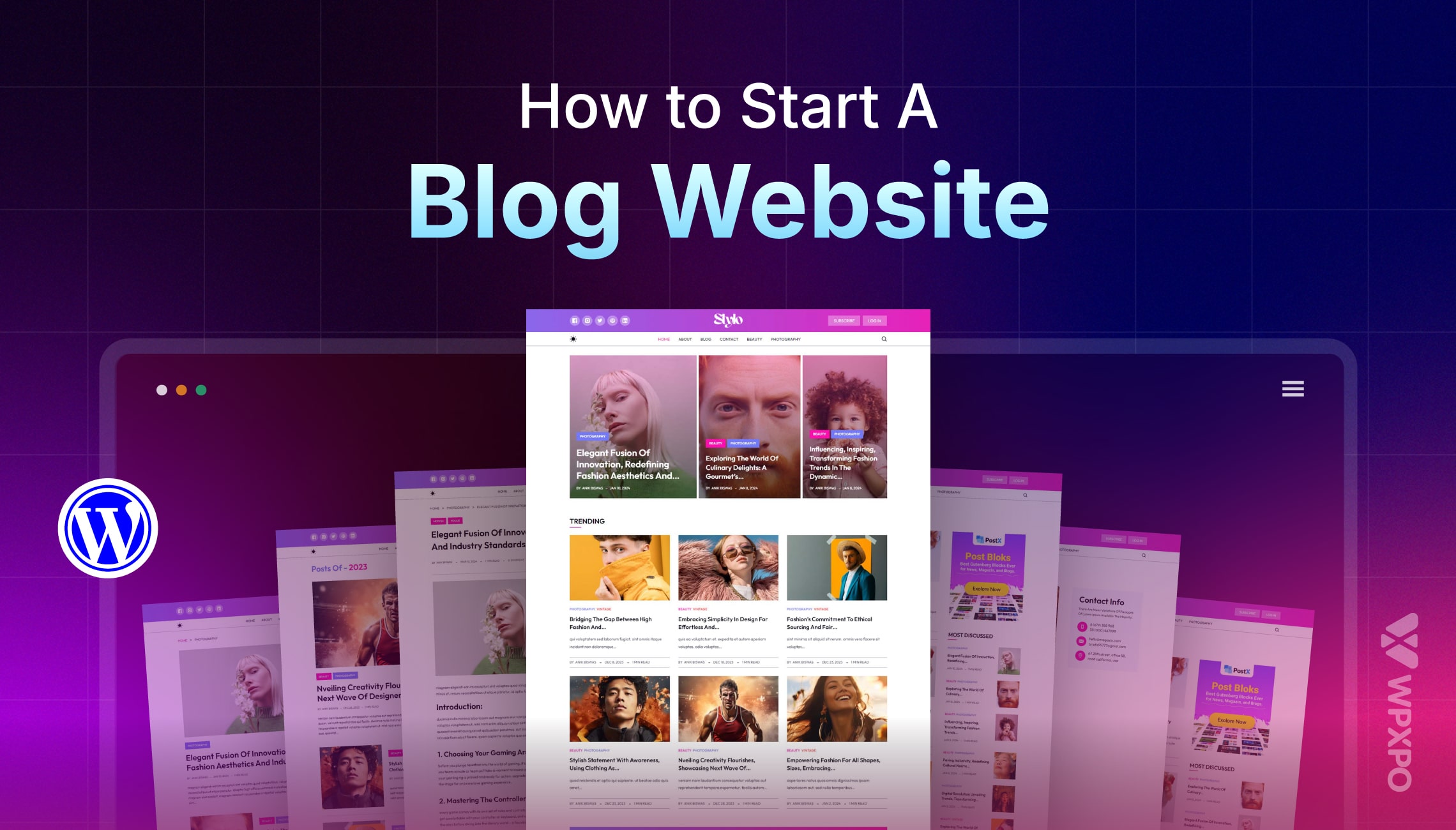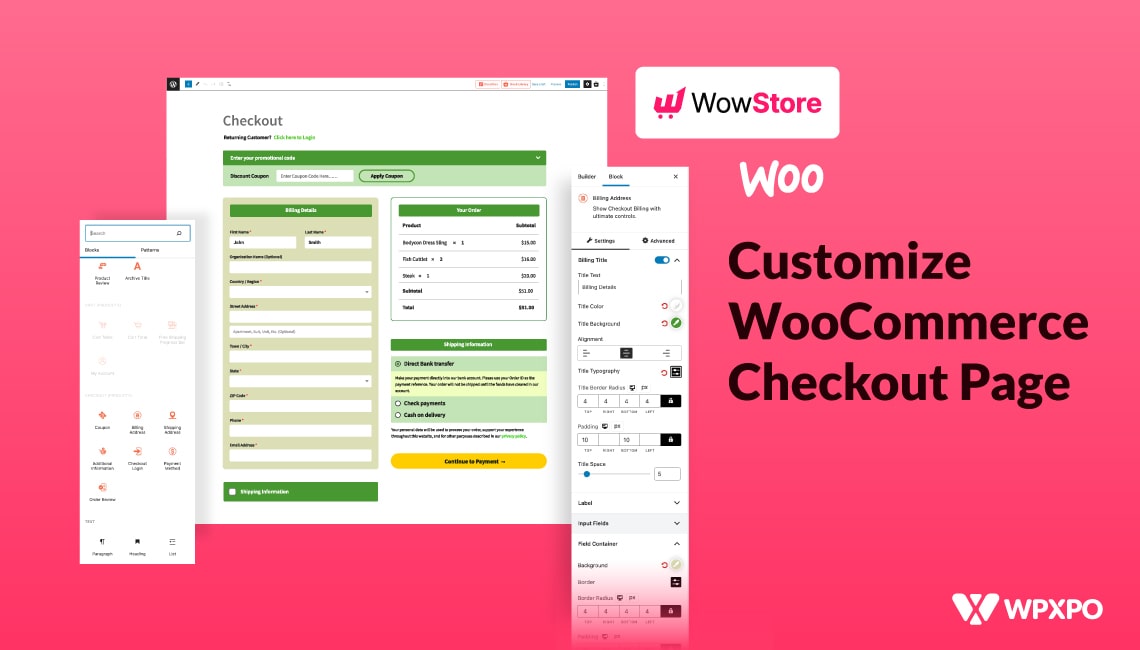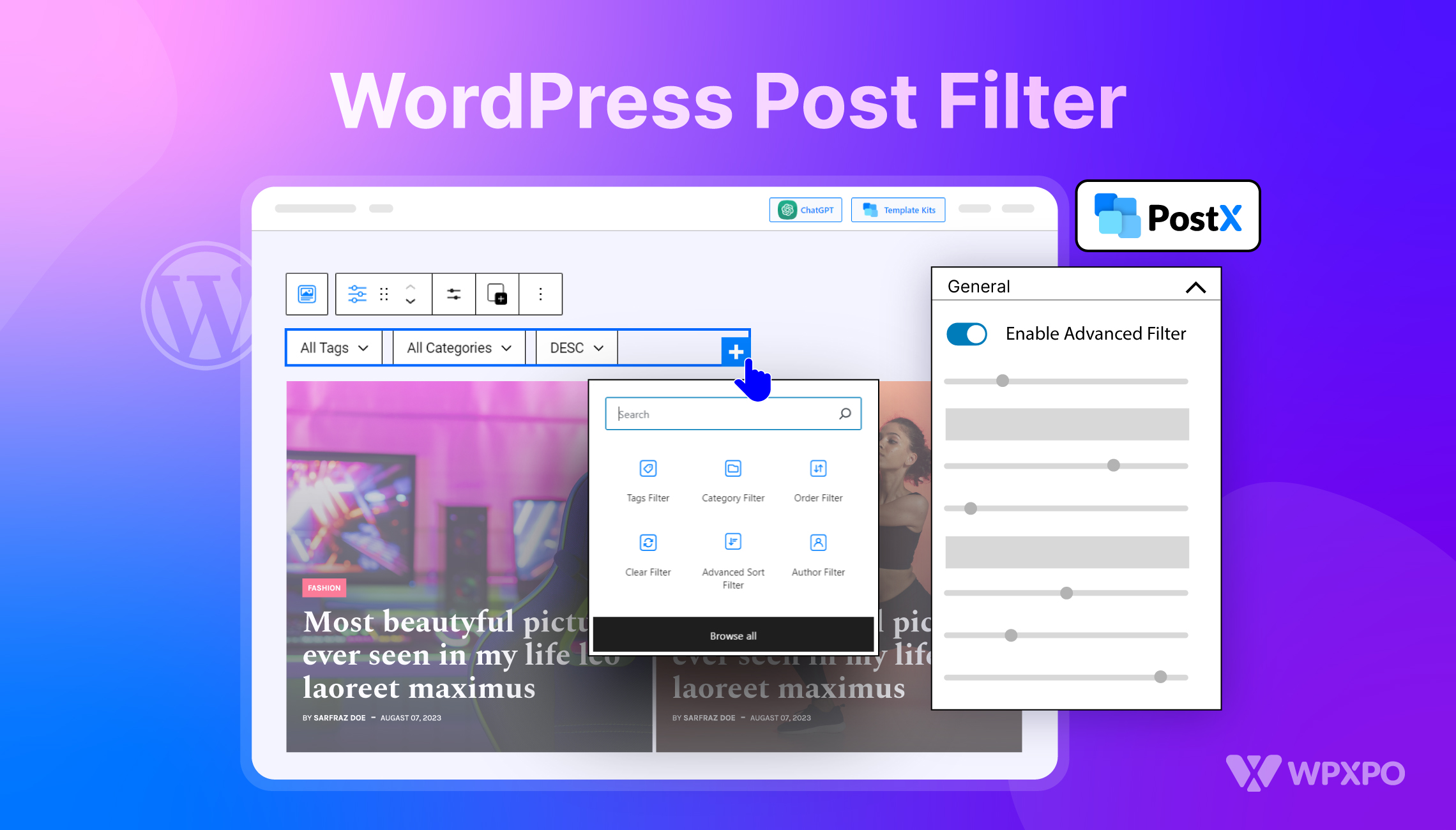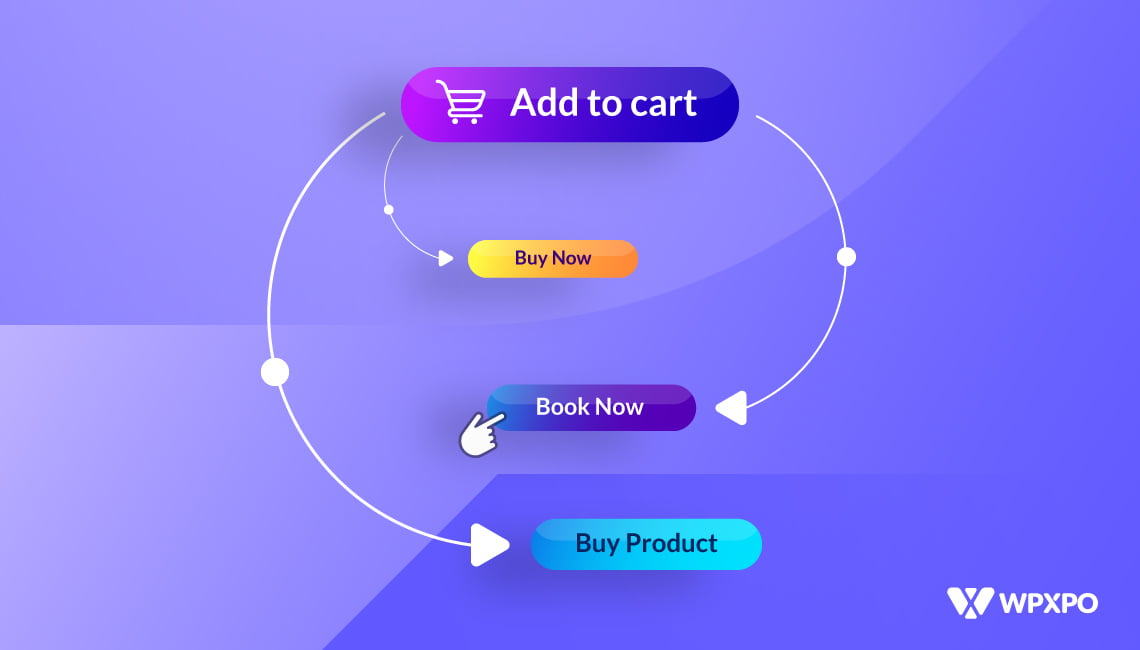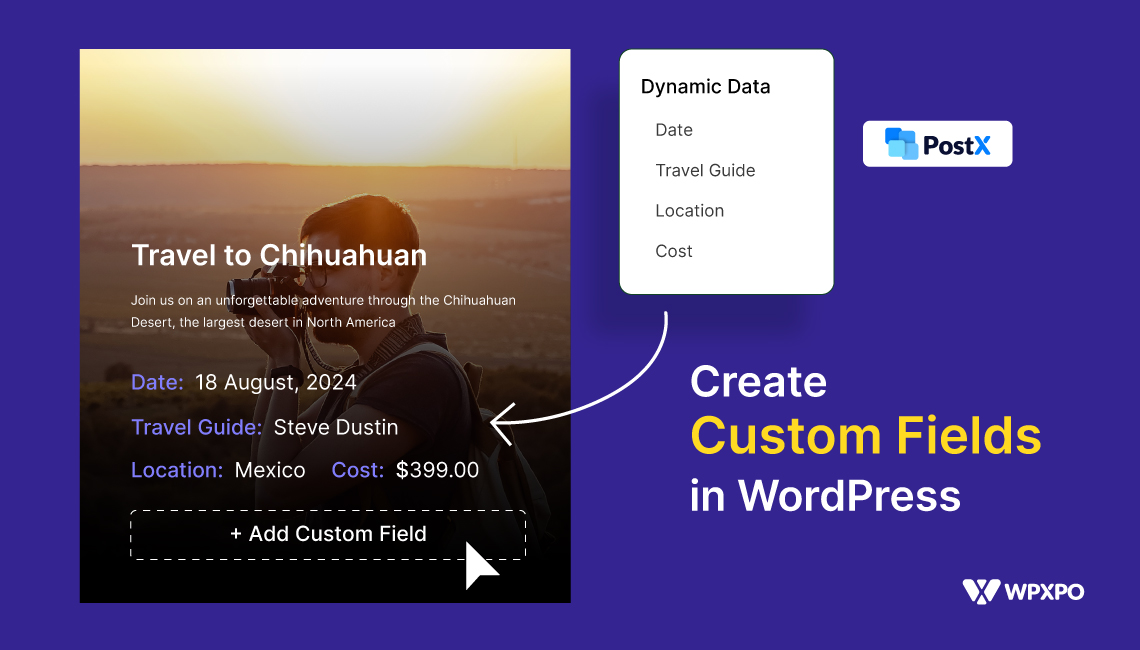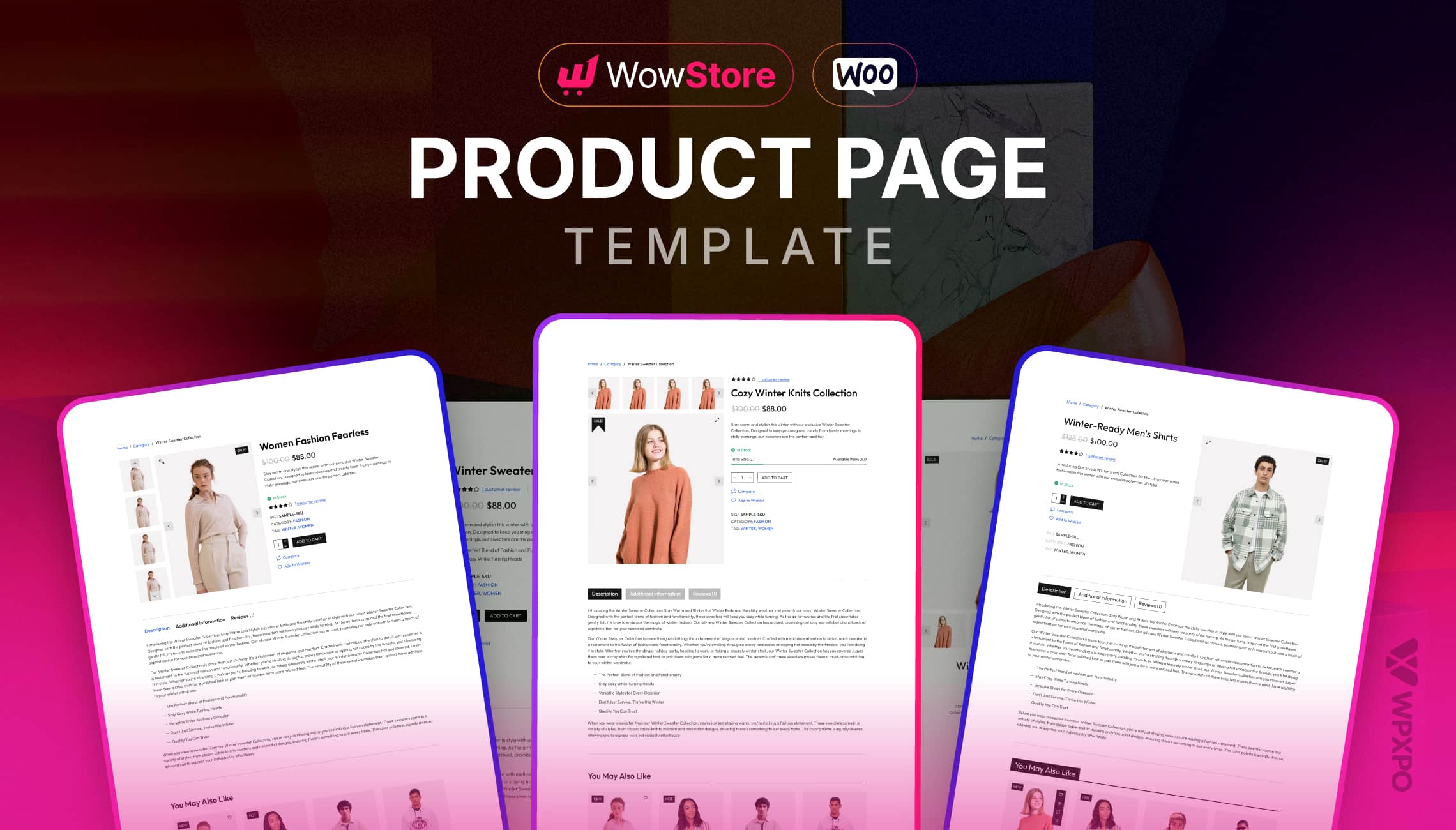Have you always wanted to launch your own blog but never got around to creating one? From finding the niche to designing the website to promoting your blog – the entire process may seem like a long journey. And honestly, it can get overwhelming if you are just starting out.
But it does not have to be a complex process if you follow the right approach and have guidance.
To start a blog as a beginner, you need to follow these steps:
- Choose the ideal niche
- Purchase suitable domain and hosting
- Set up the blog on the right platform
- Design the website with captivating visuals
- Implement an effective content strategy
- Promote your blog to increase traffic
- Monetize your blog for maximum profit
Each of these steps requires you to follow specific strategies. In this article, I will discuss all of those strategies and provide a beginner-friendly deep dive into starting a successful blog.
How to Start A Blog As A Beginner: Detailed Steps
While starting a blog website, first, you need to select the right niche that aligns with your interests and expertise. Next, you need to purchase domain name and reliable hosting service to ensure your blog’s online presence. Then, you can choose WordPress as a blogging platform to manage your blog posts effortlessly.
Also, make sure to create helpful and high-quality content that solves user problems. After that, promote your content to relevant forums and social media websites. You can also consider creating and posting YouTube videos as a way to market your brand and website. For monetization, consider different options such as signing up with ad networks and making affiliate deals on products you like and recommend.
To dive into each of these strategies and more, I will be discussing everything step-by-step in this section.
So, are you ready to take the initiative to launch your dream blog?
Then, grab a cup of coffee and get to work. Here are the detailed steps on how to start a blog website:
1. Find Your Ideal Niche
The first step to starting a blog is to select the right niche. It helps you focus on specific topics so that you can create high-quality content that satisfies your audience.
Here are four effective ways you can choose the right niche for your blog:
Evaluate Your Interests & Expertise
Choosing the right niche for your blog depends on the topics that you have expertise and the topics that interest you the most. For example, if you are fascinated by gaming and have always wanted to share your experience with others, creating a blog website on the topic makes the most sense.
Also, are you particularly skilled in a specific game? Maybe, you know some cool tricks for a competitive game that no one else does. Then, launching a blog on that particular game will be a great start.
Now, you may ask: What to do if I am not an expert in any topic?
You do not have to be an “expert” to choose your target niche. Do you enjoy talking about the topic? Then, simply share your experience and stories about the topic with your audience.
Maybe you are passionate about traveling and have first-hand experience with traveling to unpopular areas. You can simply share those experiences on your travel blog site.
No matter which niche you choose, be authentic and provide accurate information in your content and your audience will love it.
Also, you can hire writers who are skilled in the topic to publish great content and build a high-performing magazine website.
Get Acquainted with Trending Topics
Need inspiration for your ideal niche? Why not research what people are talking about on the internet every day?
One of the easiest ways to find the hottest topics around the world is using Google’s free tool called Google Trends. You can see the top search topics and search queries from different countries and different categories.
You can also add your own search term and know how much people are interested in that particular subject.
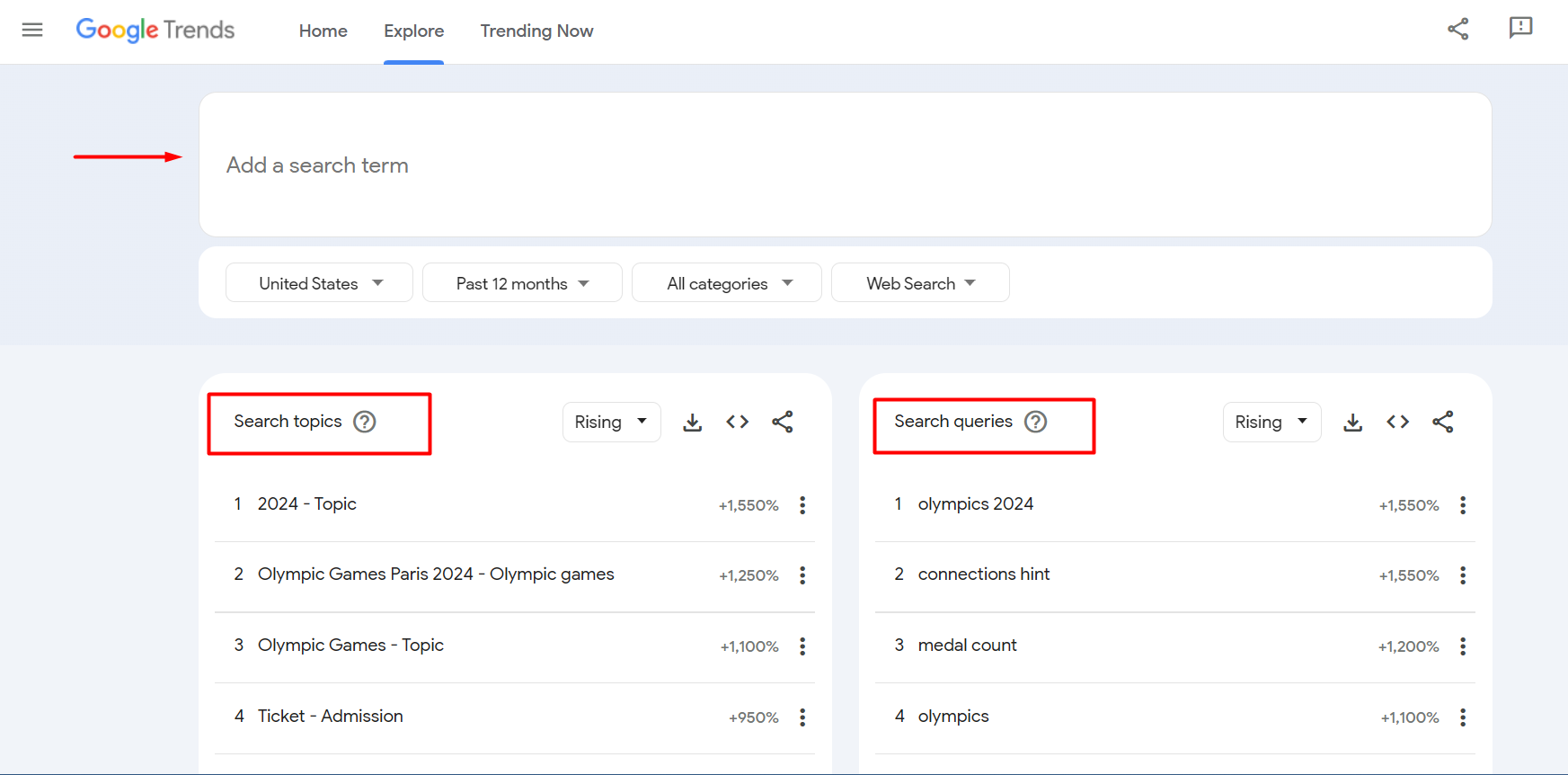
But wait! There’s another great way to find the latest trends that have taken over the internet. It’s the front page of the internet or, in other words, Reddit. Believe me, this site is a treasure trove of niche ideas.
If you go to Reddit’s popular section, you will find new and unique ideas people have been sharing. You can also choose a specific topic and see all the popular posts from that category.
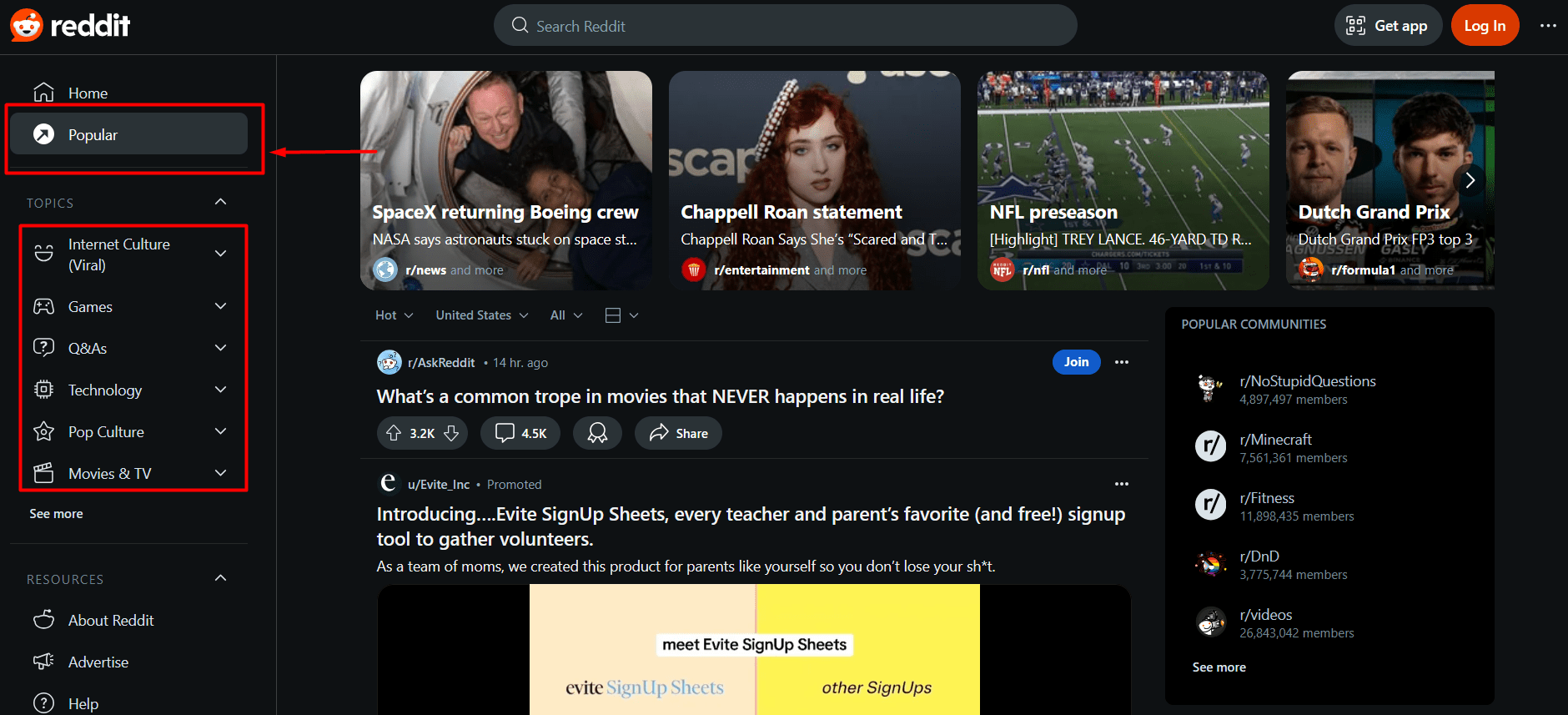
Now, go through the trending posts and their comments and get amazing ideas you wouldn’t have thought about otherwise.
Inspiration from Popular Blogs
Another great way to narrow down your search for the ideal niche is by taking inspiration from other popular blogs out there. Some of the most amazing blogs I have found helpful are:
- Harvard Business Review – to get practical business advice
- The WIRED – to know about the hottest trends
- Entertainment Tonight – to find the latest entertainment news
But there are a lot more blogs that cover a wide range of topics. Here’s a comprehensive list of the best blogs in the world from which you can take inspiration.
Analyze Traffic Potential
If you want to make profits from your blog website, you have to choose a niche that has great traffic potential. If people are not talking about the topic and not searching for it, chances are they will not visit your blog.
While you can get ideas about trending topics, you may need more specific traffic numbers for specific topics. In that case, you can utilize SEO tools such as SEMRush and Ahrefs.
Choose your main niche topic and subtopics and input them into the tools. Now, you will see accurate numbers for your selected topic.
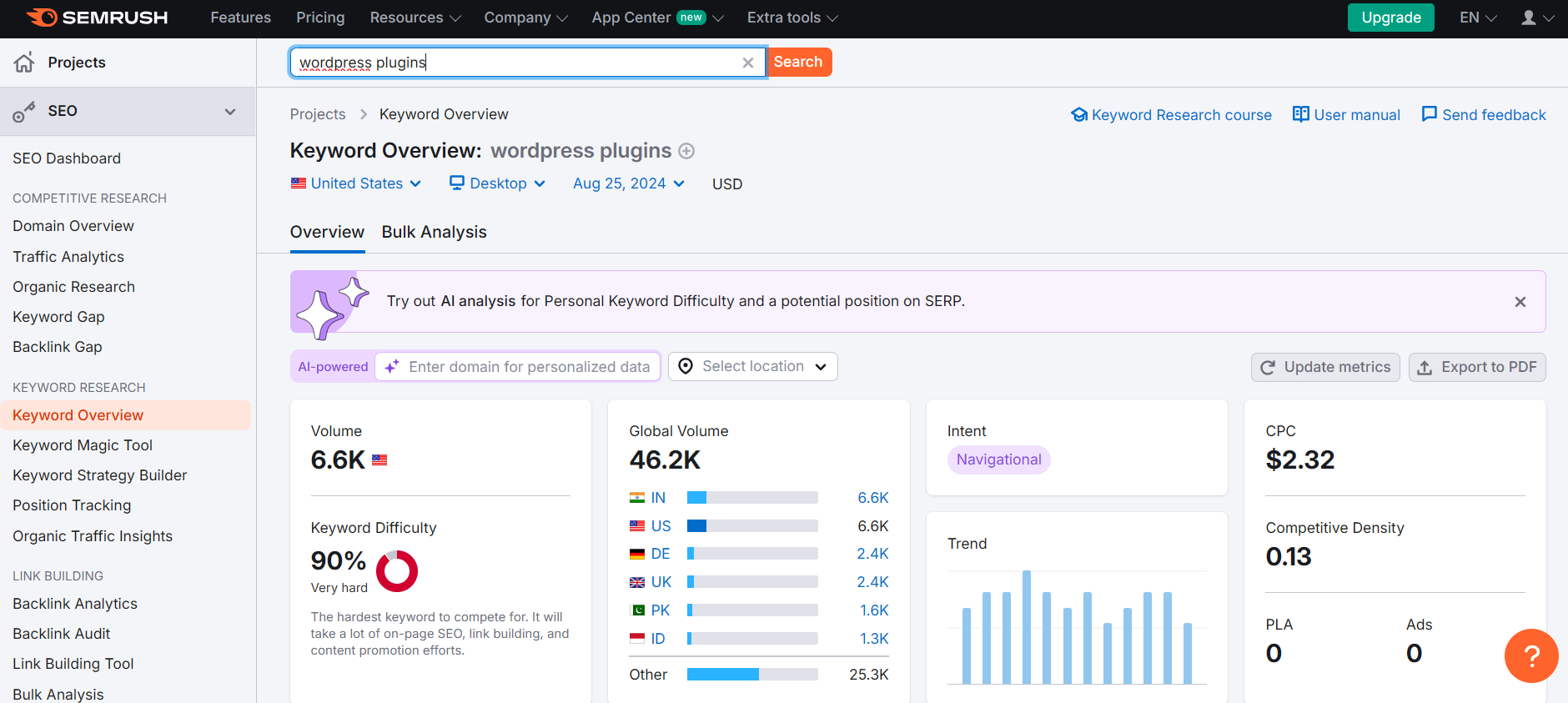
This is just an example. In the Content Strategy section below, I discuss details on how to choose easy-to-rank keywords for your target niche.
2. Choose the Right Domain & Hosting
After selecting a niche, you will need to choose a suitable domain name and a hosting provider to get started with your website.
While a well-chosen domain name enhances your brand identity, a reliable hosting provider ensures that your site remains accessible and secure.
In this section, I will help you choose the perfect domain name and hosting service so that you can start your blog without a hassle.
Choosing the Right Domain Name
Your domain name is the digital address of your blog, so it should be something that is memorable and relevant to your niche. Here’s how you can choose the best domain name for your gaming blog:
Reflect Your Content: The domain name should convey the type of content your blog publishes. For instance, if your blog focuses on traveling, your domain name should reflect that idea.
Use a Domain Name Generator: If you’re struggling to come up with ideas, using a domain name generator tool can be helpful. Tools like LeanDomainSearch can provide a variety of creative suggestions based on keywords you input.
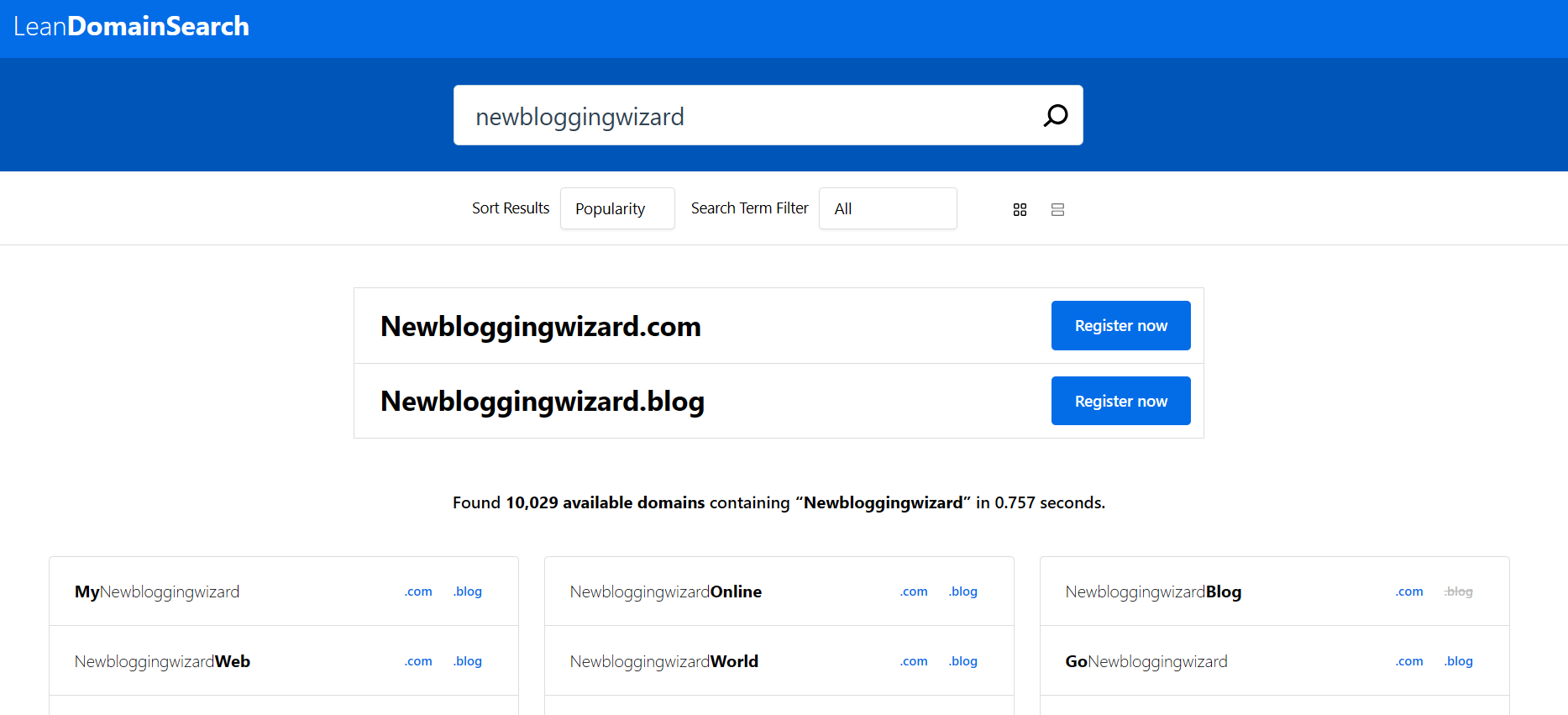
Opt for a Top-Level Domain: Buying Top Level Domains (TLDs) like .com, .net, or .org are usually recommended because they have a great reputation among users. However, you can also choose other domains that are more specific to your niche. For instance, if you have a blog talking about AI tools, you can purchase a TLD that comes with .ai.
Buying the domain: Once you have decided on the name, check its availability using domain registrars such as Namecheap, GoDaddy, or Hostinger. These platforms let you purchase and manage your domain.
Choosing the Right Hosting Provider
Choosing the right hosting provider is just as important as your domain name. It is directly related to your site’s performance and security. It also ensures your blog is accessible 24/7 to your audience.
So, how do you know if you are selecting the ideal hosting provider?
Here are the most essential factors you should consider when choosing a hosting provider for your blog:
Evaluate Different Hosting Types: Depending on your blog’s size and traffic, you may choose between different types of hosting such as shared hosting, VPS (Virtual Private Server), dedicated hosting, or cloud hosting.
If you are just starting out as a blogger, shared hosting can be a cost-effective solution. However, as your blog grows, you may need to look for other options.
Assess Performance and Uptime: Your hosting provider should guarantee a high uptime (99.9% or higher) to ensure your site remains accessible to users at all times. Also, check whether the provider supports server locations close to your target audience to ensure fast loading speed.
Evaluate Backup and Security Features: Ensure your hosting provider offers regular backups, SSL certificates, and firewalls. These features are essential to protect your blog from unprecedented data loss, hacking attempts, and other security threats.
Consider Customer Support: Choose a provider that offers 24/7 reliable customer support so that you can ask for help whenever you encounter any technical issues. This is important for the continued presence of your blog on the internet.
Buying the Hosting Plans: So you might ask: which hosting provider do you recommend for blogging?
Well, the answer will depend on the factors I have discussed above. However, some of the most reliable hosting services include Hostinger, Bluehost, and Siteground. You can evaluate each option and choose the one that best suits your needs. Also, you can choose a provider like Hostinger that comes with pre-installed WordPress so that you can quickly build your website.
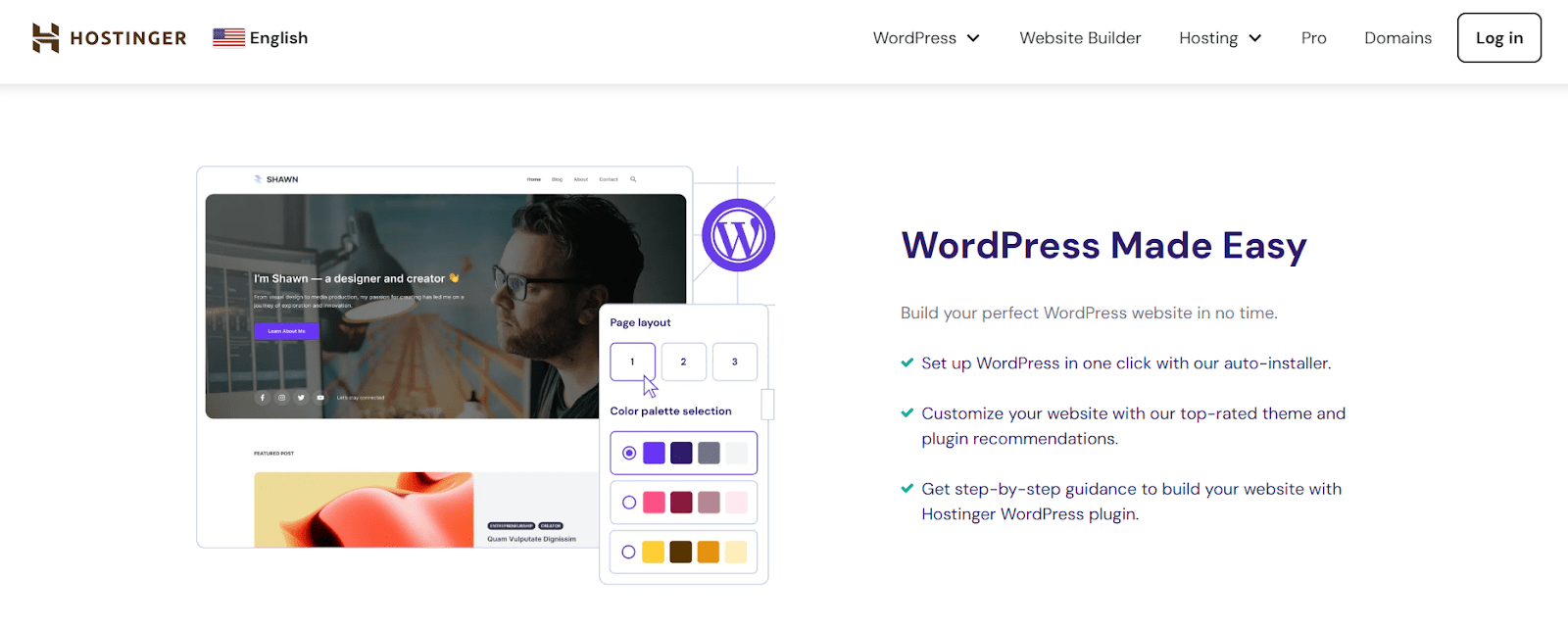
3. Pick a Suitable Blog Platform
After setting up the domain and hosting for your blog, you need to choose a suitable blogging platform that allows you to easily create, edit, and manage content.
There are many blogging platforms that let you do all of that. However, personally, I have found WordPress to be a very versatile platform, catering to beginner and professional bloggers alike.
WordPress is the most popular content management system (CMS) in the world, powering over 43% of all websites. Its widespread popularity proves its effectiveness and versatility.
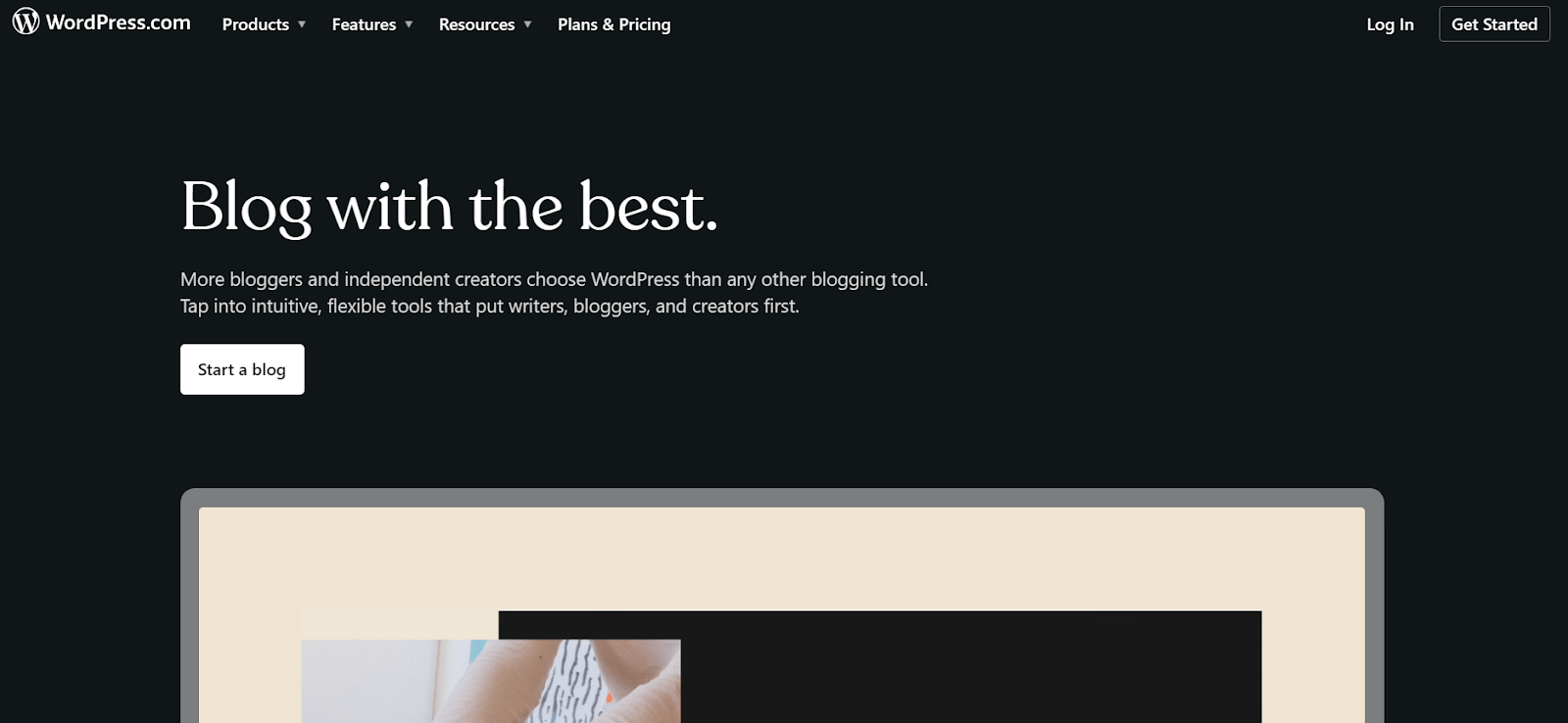
Here’s why WordPress is ideal for your blog:
- User-Friendly Interface: WordPress is designed with beginners in mind. Even if you have no technical experience, you can easily create posts, manage pages, and configure settings without touching a single line of code.
- Extensive Customization: WordPress comes with thousands of themes and plugins. So, you can easily customize your blog’s appearance and functionality to match your specific needs.
- SEO-Friendly: WordPress is built with SEO in mind. Also, free plugins like Rank Math SEO can help you optimize your posts and pages to meet the best practices for search engine optimization.
- Community Support: One of the biggest advantages of WordPress is its active community. Whether you run into technical issues or need advice on best practices, the WordPress forums and numerous online tutorials offer a wealth of resources.
How to Set Up WordPress for Your Blog?
There are several ways to set up WordPress to get started with your blog. You can follow this detailed guide: 4 Ways to Install WordPress and use the method that is suitable according to your hosting plan.
However, I personally recommend choosing a hosting provider like Hostinger that comes with pre-installed WordPress. This makes it easier to get started with a blog without any complicated setup process.
4. Design a Captivating Website
After setting up WordPress, you will notice that it comes with a default theme. However, for a customized blog that meets your expectations and captivates your audience, you need to design it according to your preferences.
If you want to easily design your website without any coding, there are two main ways:
- Using a WordPress blog theme
- Using a Site Builder plugin like PostX
I will provide a detailed explanation for both methods so that you can choose the option that best suits your requirements.
Method 1: Use a WordPress Theme
Using a theme is a quick and straightforward way to design your blog. WordPress offers thousands of themes, both free and premium, that can be installed with just a few clicks.
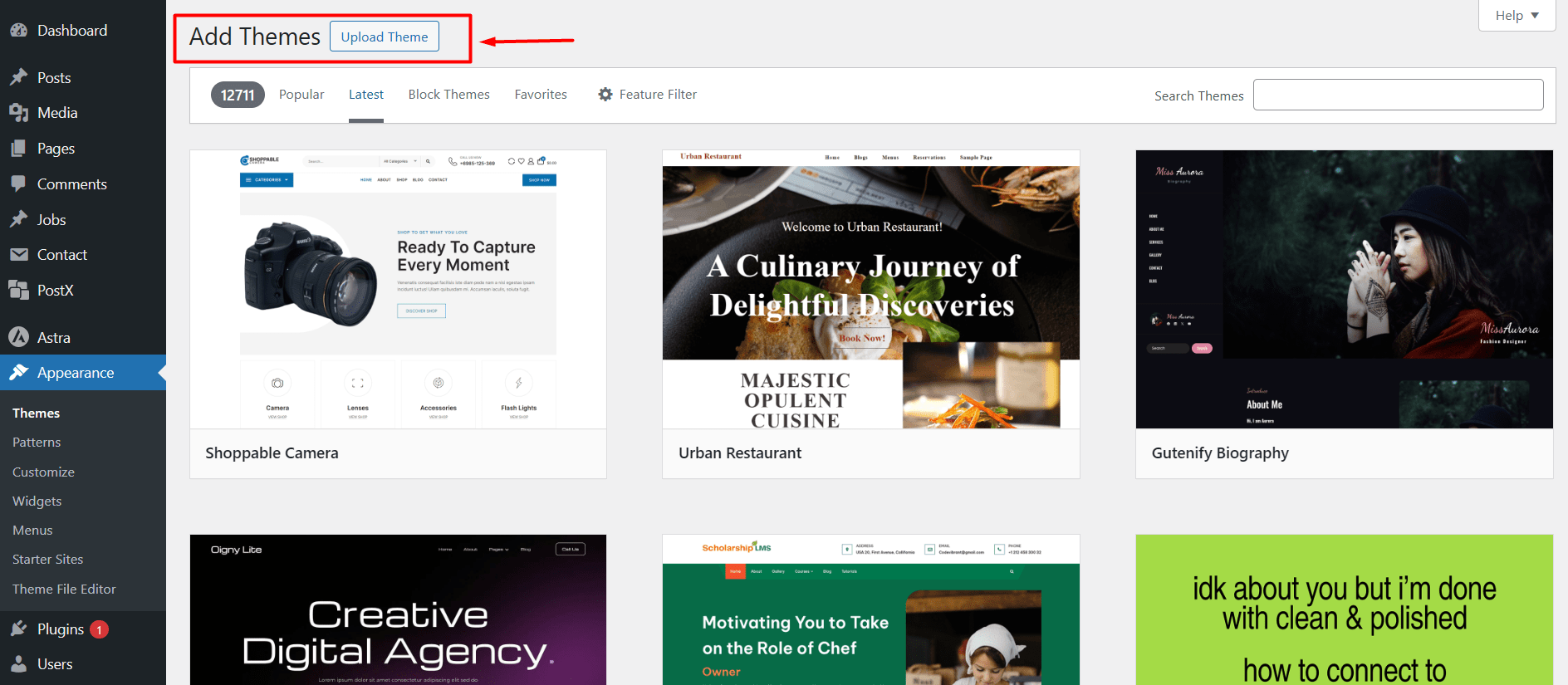
Here’s how to choose the right theme:
Niche-Specific Look: Before selecting a theme, determine how you want your blog to look. Based on your niche, you can choose specific themes. To find relevant themes for your blog, you can use the Feature Filter option in the theme section.
Visit your admin dashboard and navigate to Appearance > Add New Theme. Now click on Feature Filter. Here, you will find a list of different subjects and features which you can choose to find your desired theme.
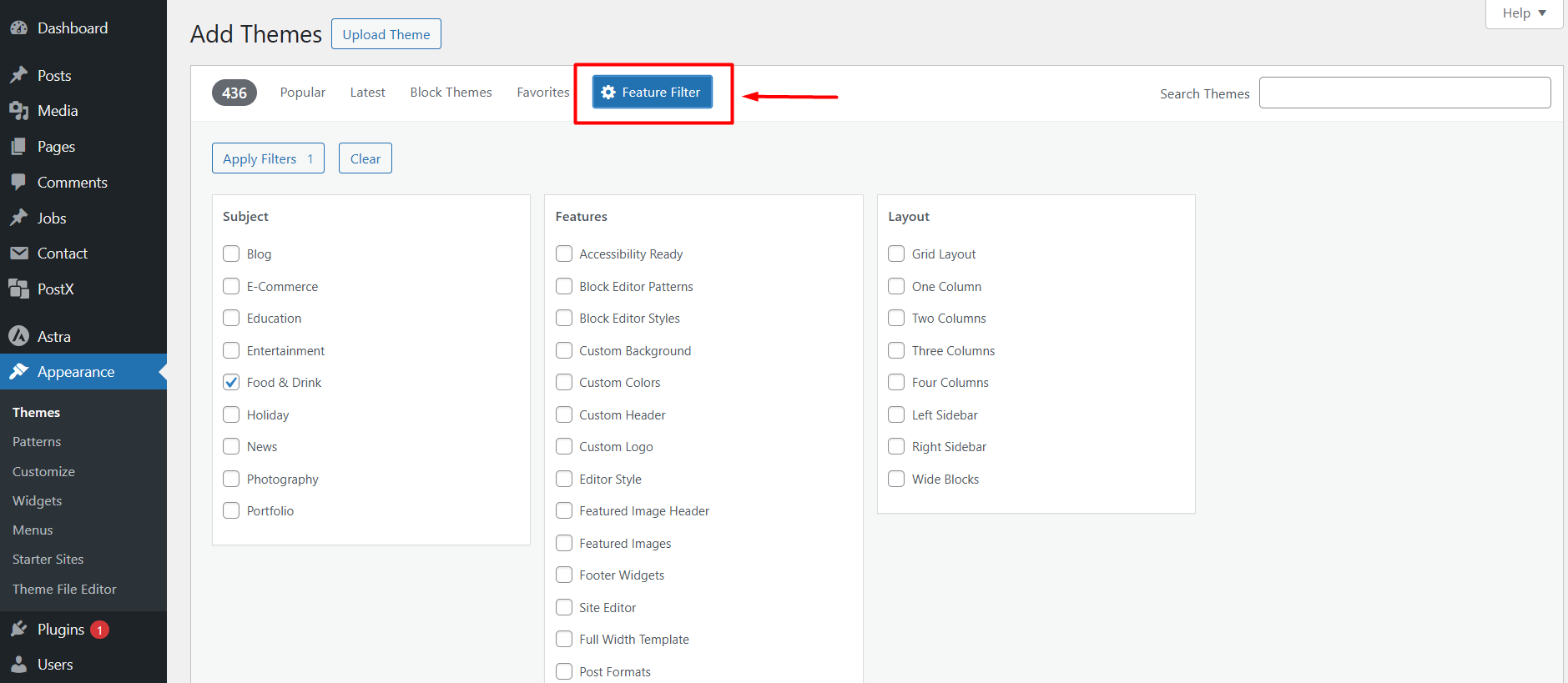
For example, if you want to create a food recipe blog, simply choose the option Food & Drink. Now, you should see a list of themes having a layout that matches the vibe of a food blog.
Once you’ve selected a theme, you can use the built-in preview feature to see how it will look with your content.
Most themes allow you to customize different aspects of your website such as colors, fonts, and layouts so that they match perfectly with your blog.
If you need specific suggestions on the best themes for your blog, you can watch this helpful video:
Method 2: Use a Site Builder Plugin
You can design a blog website using themes just fine. However, if you want a faster and more effortless solution, you can use a Gutenberg site builder plugin like PostX.
In case, you don’t know, PostX is the leading Gutenberg site builder that lets you design a complete website in just a few clicks. With its unique feature Starter Sites, you can import an entire ready-made website. So, you don’t need to code a single line to create a beautifully designed blog.
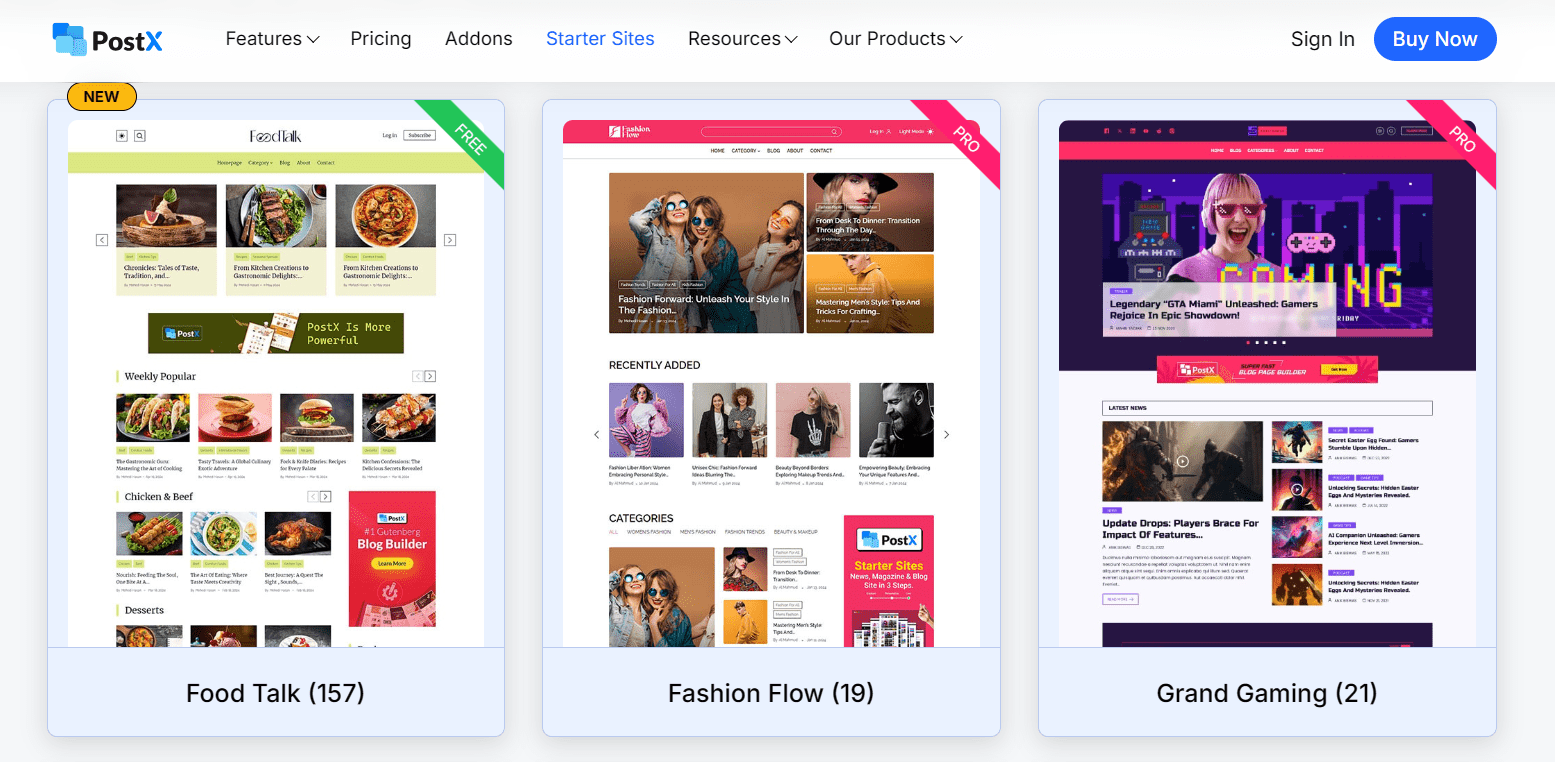
What’s more interesting, PostX offers many popular site templates for specific niches, letting you create your dream fashion, travel, food, gaming, and magazine blog without spending hours.
Here are the quick steps to design a blog with PostX:
- Choose Niche-Specific Template: With PostX installed, go to PostX > Starter Sites on your admin dashboard. Choose the template that is relevant to your blog’s niche. For example, I want to start a magazine blog, so I am choosing a template that matches the vibe.
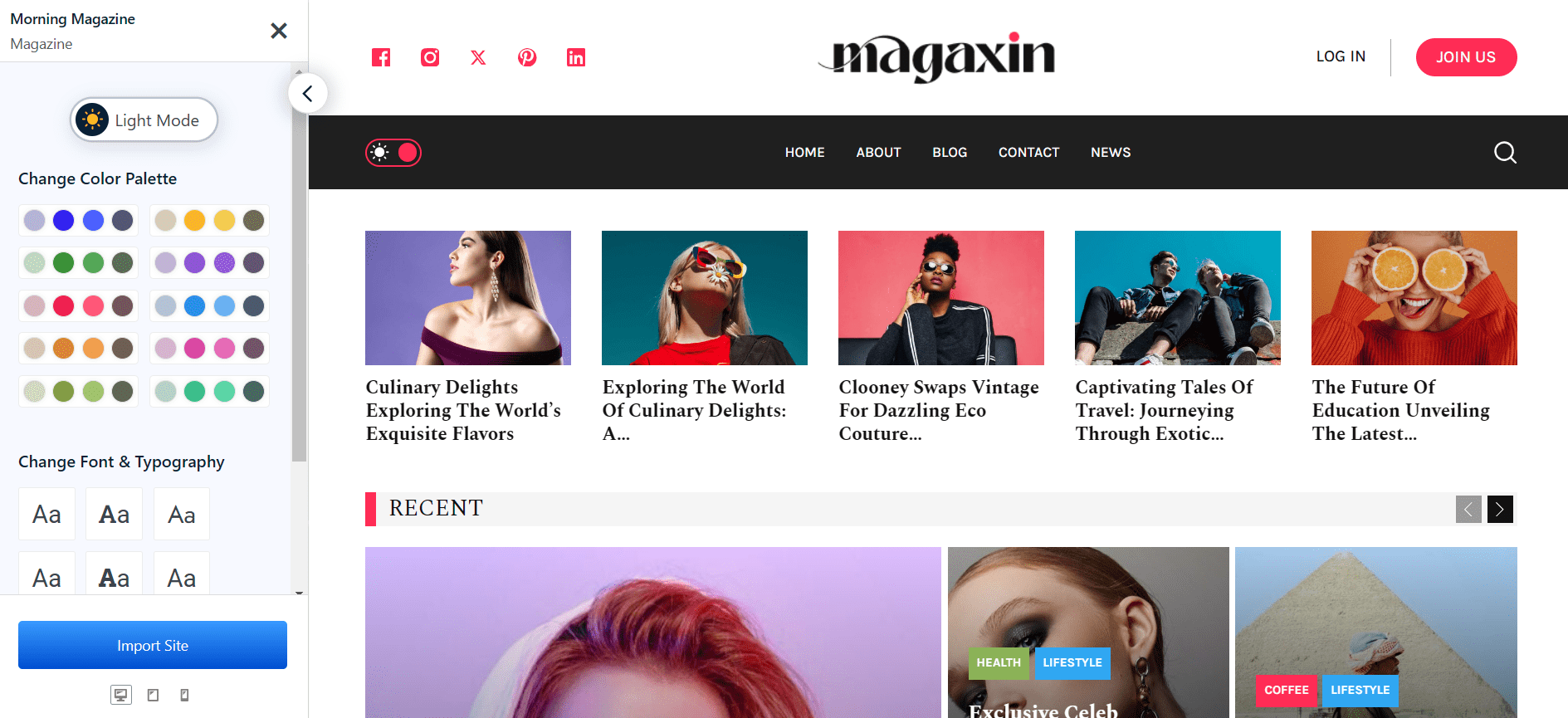
- Set Global Styles: After clicking on the template, you will have options to change the default color palette, font, and typography that best suits your preferences.
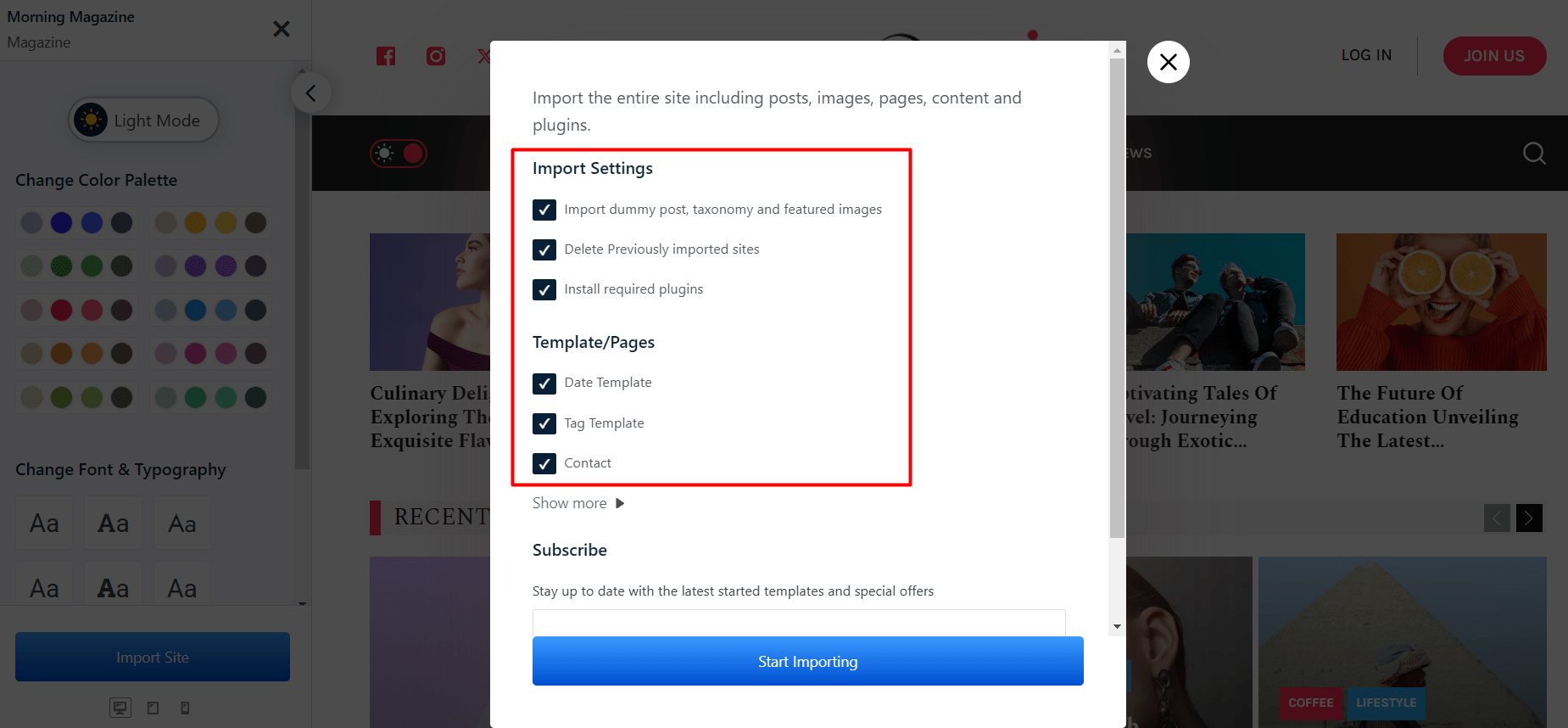
- Import The Site: Now click on the Import Site button and customize options whether you want to import dummy posts and templates for essential pages like Home, Blog, About, and Contact. And finally, click on the Start Importing button.
Now wait a few moments and you will see a message saying your site is ready. You can fine-tune each page with unique layouts using the Site Builder feature of PostX.
If you want to watch a tutorial on the process: here’s a helpful video on creating a blog website using PostX:
5. Implement an Effective Content Strategy
Now that your website is ready to publish, you need to create a content plan to help you bring organic traffic. Here are the effective ways to implement an actionable content strategy for your blog:
Research User’s Pain Points
To create relevant content, first, you need to research your target audience and understand their pain points. Learn about what issues they are facing and how your blog posts can help them.
One great way to understand your niche audience is by exploring forums like Reddit and Quora. For example, if you are interested in computer games, you can visit the dedicated PC Gaming subreddit.
You can also follow topics on Quora and look at user’s posts to get ideas for your content. For instance, following the PC Gaming Quora topic will display various questions and answers submitted by other users.
Choose Relevant Keywords
Okay, you have researched your audience and noted down topics you want to write about. But now, you need to choose specific keywords that should be covered by your articles.
Utilize Google Search: The best way to find relevant keywords quickly is to search your main topic on Google and look out for suggested keywords. Here, you will see many content ideas you can write about.
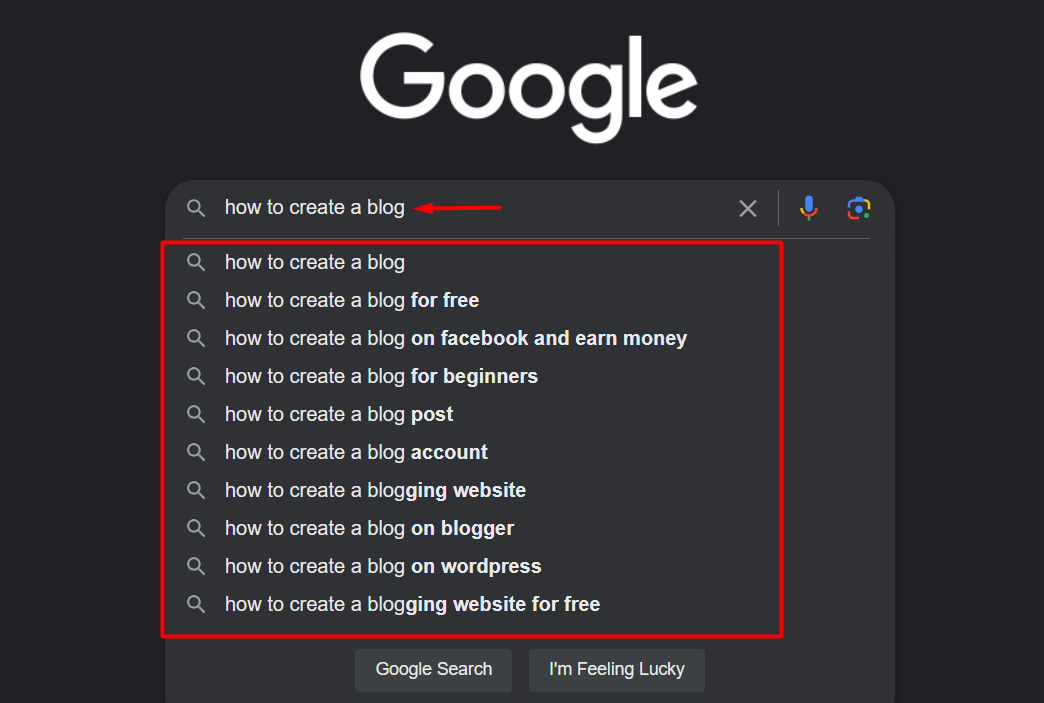
You can also check the People Also Ask section of Google to get more ideas.
Get Specific Data from SEO Tools: You can get specific data for topics such as keyword difficulty and search volume using SEO tools such as SEMRush and Ahrefs.
It is also easy to find low-competitive keywords using these tools. So, if you starting a new blog website, it is a good idea to write content on keywords with easy difficulty.
For example, for the topic “start a blog”, there are numerous keywords to choose from. Using the SEMRush tool, you can use a keyword difficulty filter and easily select the ones that seem suitable for your blog.
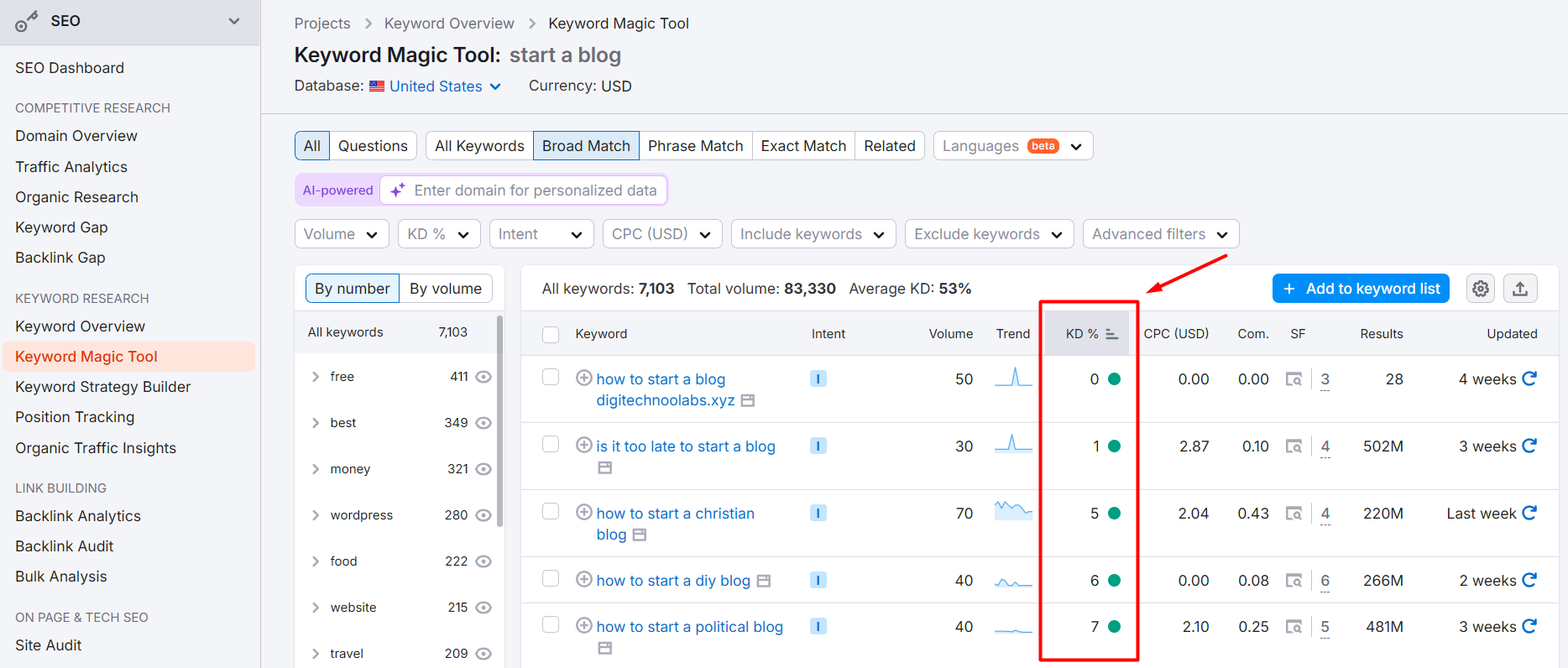
Check out this detailed guide on finding low-competition keywords using SEMRush.
Maintain A Content Calendar
Creating content without a proper goal does not bring the expected output. For that reason, you need to plan a content calendar.
A content calendar is your one-stop hub to track your blog post’s topics, schedule, assigned writers, editing status, published date, performance, and so on. So, using this centralized file, you can easily manage all your commitments related to publishing content.
Craft Helpful Content
Ensure High-quality Content: While writing articles, you need to create helpful content that solves user’s problems. It should include accurate and updated information so that users get satisfying answers to their queries.
Google has official documentation on what Helpful Content means. You can read the document and follow the guidelines to craft engaging content that helps your target audience.
Hire Writers with First-hand Experience: You can write your own blog posts if you have the time and expertise. However, if you want to publish a good amount of content consistently, you may want to hire writers with niche-specific experience.
Let’s say, your blog talks about WordPress plugins and themes. So, you should hire writers who have used the products themselves and have technical expertise. In that way, they will be able to address user’s pain points and provide very high-quality content.
6. Promote & Grow Your Blog
Growing your blog requires more than just publishing content. It needs promotion strategies that attract readers and keep them coming back. Here are some unique ways you can grow your blog to gain maximum reach and engagement.
Post to Relevant Forums
Sharing your knowledge on relevant online communities is a great way to promote your blog. For example, if you are starting a travel blog, you can find relevant subreddits to share your work.
Simply visit Reddit, search by the term “Travel” and move to the Communities tab. This will show all the relevant subreddits that talk about travel.
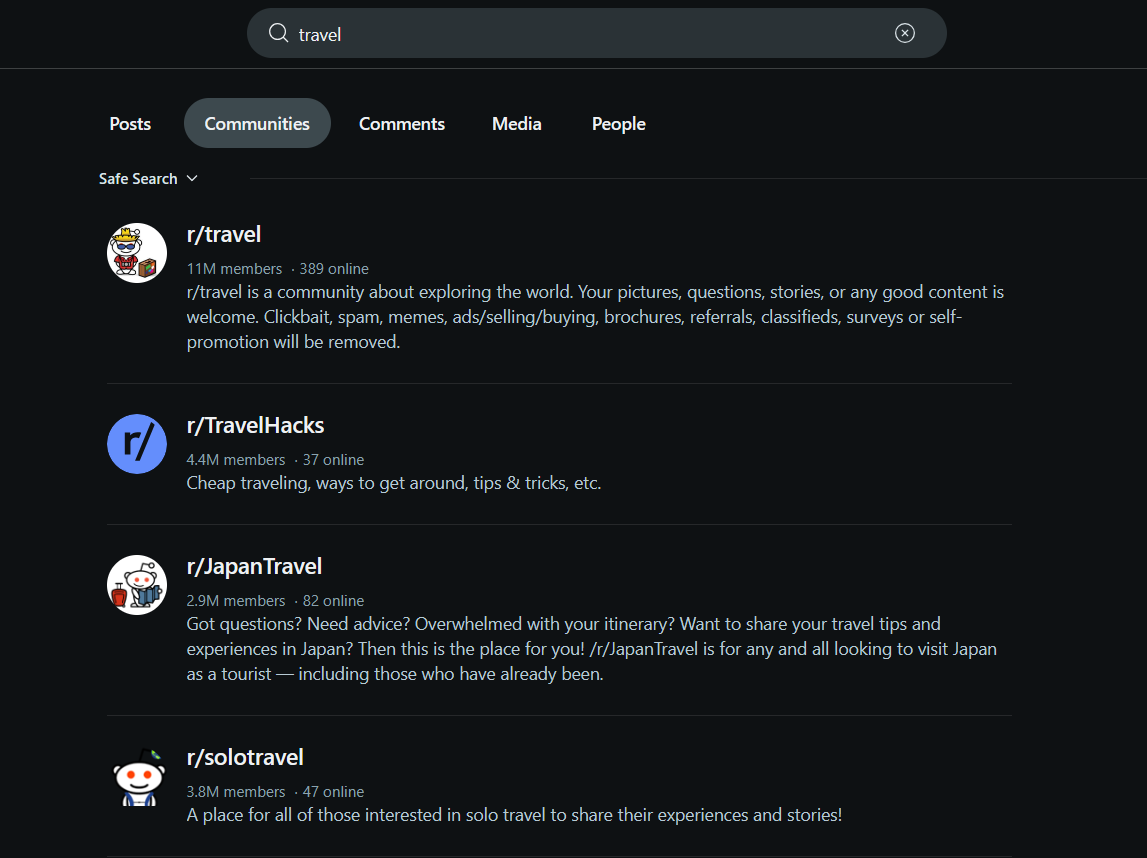
Now, you can start engaging with other users and provide your expertise. You can directly promote your blog post in some specific subreddits. However, make sure to check each subreddit’s specific rules before posting.
Repurpose Content for Social Media
After you have published a blog post on your website, you can repurpose its content for social media. For example, you can give a brief overview of your lengthy article on Facebook, Twitter, and Instagram. And then invite readers to explore the entire article if they are interested.
This helps boost not only your social presence but also bring new users to your blog.
Post Regularly on LinkedIn
LinkedIn is a great platform to strengthen your professional presence. If you post regularly with helpful content, it helps you build thought leadership on the selected topic.
As you promote your blog’s content on LinkedIn, like-minded professionals will check your profile and your website, resulting in more exposure for your blog.
Create A Newsletter
Creating a newsletter is a great way to connect with new readers. It helps you maintain consistent traffic to your site and build a strong audience for your blog.
When users find one of your blog posts helpful, they may be interested in exploring your future posts. That’s when email newsletters come in handy. You can encourage signing up for your newsletter by offering exclusive content and guides.
You can also check out some of the best email newsletter software and make the process easier for you.
Seek Guest Blogging Opportunities
Look for guest blogging opportunities on the sites that are popular in your selected niche. In case, you didn’t know, guest posting is a marketing strategy that involves writing articles for another blog or website in your niche.
This can be a great way to improve your blog’s exposure and reach a new audience. Also, you can get backlinks to your site, improving your site’s reputation.
7. Monetize Your Blog
Okay, you have done all the hard work, but now comes the most important part. Yes, I’m talking about monetizing your blog.
There are several ways to earn money from your blog website, but I have listed down the most effective methods you can implement.
Sign Up with Ad Network
One of the most popular ways to monetize your blog is selling ad space on your blog and signing up for an ad network such as Google AdSense.
After setting up AdSense, it automatically places relevant ads on your site. Based on the number of clicks and views of the ads, you earn a commission.
Utilize Affiliate Programs
You can sign up for affiliate deals with popular brands in your niche. For example, if your blog talks about trendy fashion, search for top fashion brand’s affiliate programs.
After getting your unique affiliate link, you can start to promote the products on your site. Every time someone purchases a product or service through your link, you will earn a certain amount of commission.
Create a Subscription Model
Another great way to monetize your blog is to create a subscription service. You can offer users exclusive access to your most premium content or allow them to browse ad-free.
This method of monetization can be beneficial if you are looking for a steady source of income generated through your blog.
These are some of the most effective strategies to monetize your blog. If you need more ideas, you can check out this comprehensive guide on monetizing your blog.
Why Should I Start A Blog Website?
Starting a blog can be a transforming experience for your personal and professional life. In addition to getting a platform to share your thoughts with others, a blog can also lead to financial freedom.
Here’s why starting a blog can be a great option:
Creative Space for Your Thoughts
Blogging gives you a creative space to share your knowledge, experience, thoughts, and your life’s journey. Whether you are interested in writing, photography, cooking, or technology, a blog offers the perfect medium to showcase your talents.
Building Authority in Your Niche
When you produce high-quality content in your blog on a specific topic, you start to build authority and credibility within that niche. Readers start to consider you a go-to source for a particular topic.
For example, Neil Patel has consistently put out great advice about marketing and SEO strategies. As a result, he has established himself as an authoritative figure in the digital marketing world.
Networking and Opportunities
Blogging isn’t just about writing, it’s also about connecting with others. Through your blog, you can build a network of like-minded individuals, collaborate with other bloggers, and even attract opportunities such as guest blogging.
One great example of this is the founders of the blog “The Minimalists” Joshua Fields Millburn and Ryan Nicodemus. They started by sharing their journey about following a minimalist lifestyle. Their blog not only connected them with a vast audience but also led to book deals, a documentary on Netflix, and speaking tours across the world.
Monetization Potential
While blogging can start as a passion project for many people, it has the potential to generate significant income. From ad revenues to affiliate marketing and product sales, there are numerous ways to monetize your blog.
One of my favorite creators, Ali Abdaal, is a great example of this. He talks about how he has made millions of dollars by writing online in this video:
Tips to Maximize Profits of Your Blog Website
Maximizing profits from your blog requires a combination of strategic planning, consistent effort, and smart decision-making.
Here are some tips to increase profits after launching a blog:
Focus on Creating Evergreen Content
Creating evergreen content that is helpful to users for a long time is a great way to maximize revenue for your blog. This type of content leads to high traffic consistently – resulting in better monetization opportunities.
Partnering with an experienced SEO agency can also help you identify and optimize such content opportunities more effectively.
One of my favorite SEO Experts, Brian Dean has implemented this same strategy in his blog “Backlinko”. He prioritized creating very detailed and helpful content, that allowed him to rank high even for competitive keywords.
Diversify Income Streams
Relying on a single source of income can be risky. Instead, you can diversify your revenue streams by combining ads, affiliate marketing, sponsored posts, and product sales.
When your blog’s traffic grows, you can consider creating and selling digital products like eBooks, courses, or exclusive memberships.
Connect with Your Audience
Building a loyal audience is key to your blog’s long-term success. Engage with your readers through comments, social media, and email newsletters to build a community around your blog.
For example, you can consider creating a Facebook group or a forum where your audience can discuss topics related to your blog. Also, hosting live Q&A sessions or webinars can help you build authority in your niche.
Don’t Shy Away from Investing in Marketing
Marketing your blog is essential for growth. Use social media, email marketing, and collaborations to promote your content and attract new readers.
For instance, you can consider investing in paid advertising, such as Facebook Ads or Google Ads. Also, collaborating with influencers or guest posting on popular blogs can expand your reach to new audiences.
Summing Up
Starting a blog website can be an exciting and rewarding journey and it can offer you many benefits: from personal satisfaction to financial gain.
If you choose the right niche, design a captivating website, and implement effective content and marketing strategies, you can expect to get positive results from your blog.
Remember, consistency is key, and with time and effort, your blog can grow into a powerful platform.
Resources You’ll Love
- How to start a gaming blog
- How to start a travel blog
- How to start a food blog
- How to start a news blog
Frequently Asked Questions
What are the best platforms to start blogging as a beginner and earn money?
Here are the best platforms for beginner bloggers to make money:
- Blogger.com: Free, easy to start, monetization with Google AdSense.
- WordPress.org: Customizable, SEO-friendly, monetization with ads, affiliate marketing, and sponsored content.
- Medium: Easy to use, potential to earn through the Partner Program, has a built-in audience.
How can I make my free blog look professional?
Starting a blog for free does not mean your blog needs to look generic. Here are some must-follow strategies to make your blog site more professional:
- Choose a clean and simple theme: A simple but well-designed theme without too many distractions can give your blog a professional vibe.
- Use high-quality images: Pictures add great value to any site and it is true for your blog as well. Add high-quality relevant images that will captivate your audience.
- Write clear and concise content: Focus on delivering value to your readers. Create content that provides your expert opinion and solves users’ problems.
- Showcase Your Unique Style: Don’t just follow what others are doing. Try to add your own element to your blog’s content, design, and other factors. It will make your blog stand out among the crowd.
How can I attract more readers to my blog?
To attract more readers to your blog, you should start implementing effective strategies. Here are some of them which will give you a good start:
- Create high-quality content: Share valuable information that your target audience will appreciate.
- Promote your blog on social media: Share your posts on platforms like Twitter, Instagram, and Facebook.
- Engage with other bloggers: Comment on other blogs and participate in online communities.
- Use SEO techniques: Optimize your blog for search engines to improve your visibility.
- Build an email list: Collect email addresses to send out newsletters and promotions.
Remember: Building a successful blog takes time and effort. Be patient, consistent, and always strive to create the best content possible.
Can Anyone Start A Blog?
Yes! Whether you’re a beginner with no technical experience or an expert in a specific field, anyone can start a blog. There are plenty of tools and resources available to guide you through the process, from choosing a niche to setting up your site. If you want to quickly launch a blog with a beautiful design, the PostX plugin is a cost-effective solution.
How Much Does It Cost To Start A Blog?
The cost of starting a blog can vary. You can start with minimal investment by using free platforms like WordPress.com or Blogger. However, for a more professional setup, you’ll need to invest in a domain name, hosting, and possibly premium themes or plugins. So, depending on your options, the cost will greatly vary.
Can I Start A Blog With No Money?
Yes, you can start a blog with no money by using free blogging platforms. However, keep in mind that free platforms come with limitations, such as a lack of control over your domain name and limited customization options. If you’re serious about blogging, investing in domain, hosting, and premium plugins is highly recommended.

